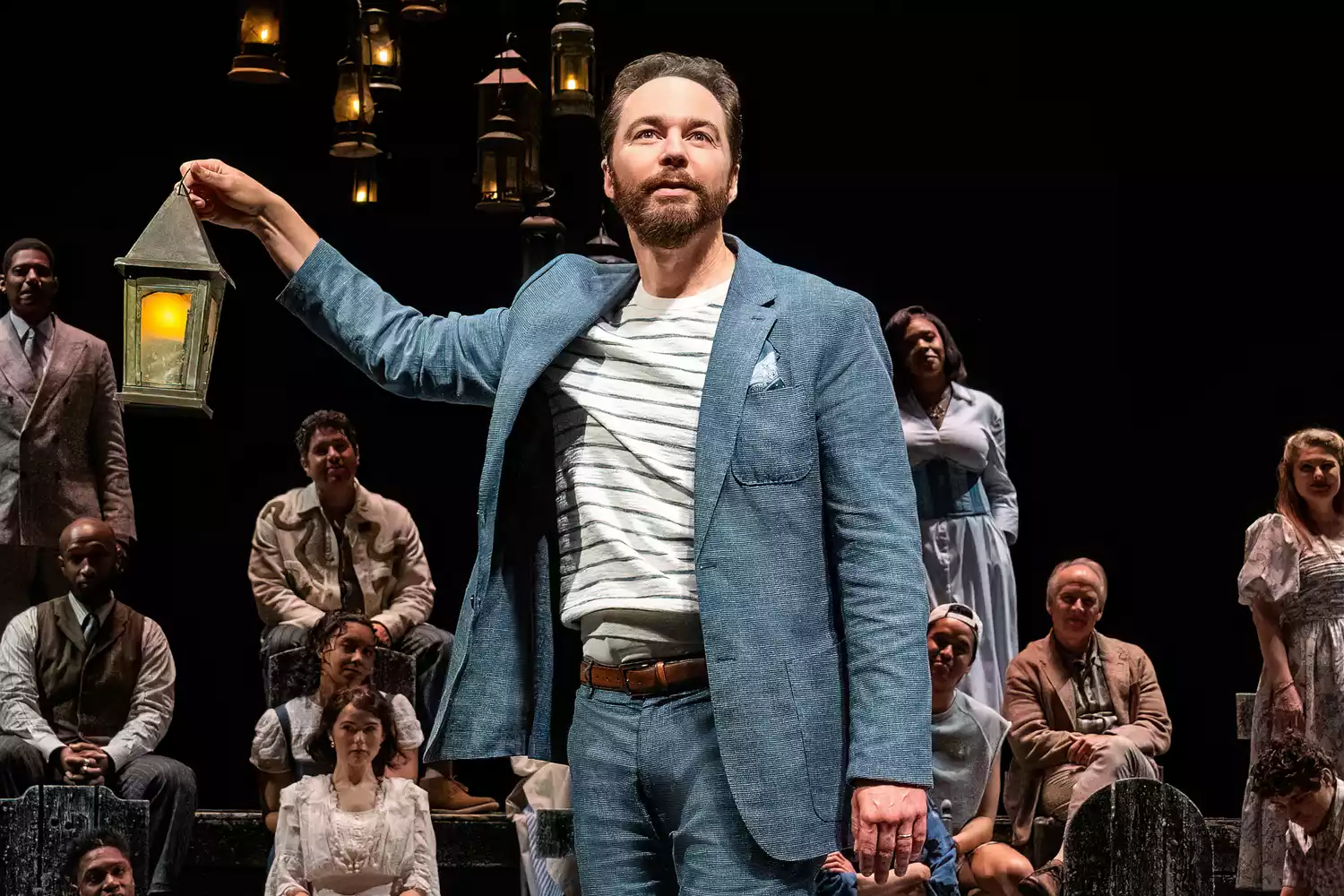Review of Our Town: Jim Parsons Leads Us Through the Enchanting Simplicity of Thornton Wilder’s Timeless Classic
The revival features performances from Zoey Deutch, Katie Holmes, Ephraim Sykes, and others.
“Do any human beings ever realize life while they live it — every, every minute?”
This poignant question from Thornton Wilder’s Pulitzer Prize-winning play remains just as relevant 86 years after its creation. The short answer? No. The longer exploration of this theme unfolds once again on Broadway, directed by Tony Award winner Kenny Leon.
As the Stage Manager, Jim Parsons opens the play by addressing the audience directly. He shares the history of the play, its cast, and the creative minds behind it, setting the stage for a journey that spans both the early 20th century in a small New Hampshire town and the present day at the Barrymore Theater.
Even before Parsons delivers his first lines, it becomes clear that the entire theater serves as the stage. The cast members gracefully navigate the aisles, illuminated by candlelight, singing a haunting hymn that brings together the audience who will soon populate the town. Audience members are seated on pews flanking the stage. True to Wilder’s vision, props are nearly nonexistent, with only two tables, six chairs, and a simple piano on display. Allen Lee Hughes’ lighting design enhances the ambiance with the occasional lantern, leaving the rest to the audience’s imagination. The sparse set creates a vastness that invites reflection.
We are drawn into Grover’s Corners, the small New Hampshire town home to the Gibbs and Webb families, neighbors who experience the full spectrum of life—from growing up and falling in love to confronting death. Leon’s inclusive casting approach reflects the world we live in: the Gibbs family is Black, while the Webb family is white. The professor who provides essential context is portrayed by Native American actress Shyla Lefner, and the local milkman, played by deaf actor John McGinty, signs his lines, with his neighbors responding in kind. Although the Stage Manager insists it is 1901, he simultaneously affirms that it transcends time.

As one character succinctly puts it, we exist in “the United States of America; Continent of North America; Western Hemisphere; the Earth; the Solar System; the Universe; The Mind of God.”
Leon has condensed the classic three-act play into a streamlined 1 hour and 45 minutes. While the pacing feels deliberate, especially in the third act, it occasionally rushes through moments that hold significant emotional weight in the original text. Nonetheless, Wilder’s philosophical essence permeates the narrative. Our Town is defined by straightforward sentimentality, and while some scenes could come off as overly sentimental, they instead convey raw honesty as they grapple with the fleeting nature of human existence.
The play’s greatest strength lies in its warmth, beautifully preserved by Leon and his cast. Zoey Deutch, making her Broadway debut, shines with her natural charisma and vulnerability, essential for Emily Webb’s character arc, especially during her life’s tragic turn. Her chemistry with Ephraim Sykes, the boy-next-door who wins her affection with sweet words and an ice cream soda, is palpable. Katie Holmes, in the more understated role of Mrs. Webb, provides a steadying presence as the practical mother.
Michelle Wilson (from Sweat and A Raisin in the Sun) and Billy Eugene Jones (from Purlie Victorious) stand out as Dr. and Mrs. Gibbs, offering wisdom and warmth in their casual conversations while knowing how to deliver impactful speeches when needed.
Review of Our Town: Jim Parsons Leads Us Through the Enchanting Simplicity of Thornton Wilder’s Timeless Classic
As the Stage Manager, Parsons is a consistent presence, yet his portrayal is nuanced. He captures Wilder’s balance of dry humor and sincerity, though at times he feels somewhat distant. In moments where clarity and comfort are desired, he leaves the audience wanting more. However, when he delivers his crucial monologue in the third act, he strikes the right tone and finds the perfect words.
Arguably, Our Town lacks a conventional plot. Beyond a single drunken organist, the drama in Grover’s Corners revolves around two teenagers falling in love—not through grand gestures but through simple conversations and moments of connection. Life continues, and death inevitably follows. Ultimately, the essence of the story lies not in the events but in the profound beauty of the everyday moments.
While this production captures the spirit of Wilder’s timeless work, it also reveals something intangible that feels absent. Perhaps it’s the loss of a vital line or the shift in pacing that detracts from the show’s tranquil simplicity. Nevertheless, Wilder’s words still resonate, leading from a day to a wedding to a funeral, delivering an emotional punch. This production serves as a poignant reminder to appreciate life in all its fleeting beauty.
Grade: B
Latest new from Beuteeshop

